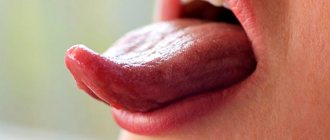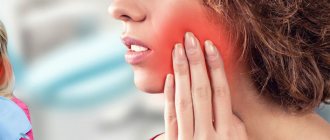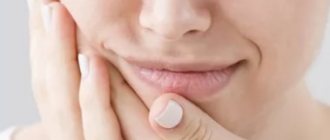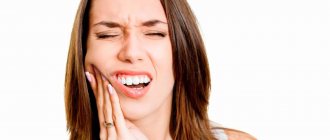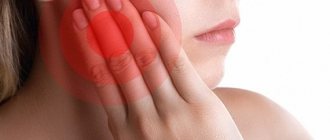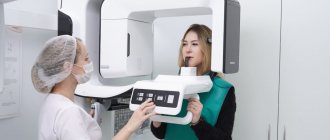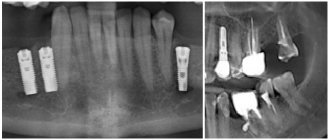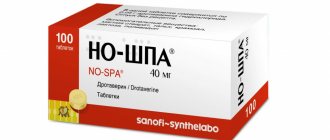Author of the article:
Soldatova Lyudmila Nikolaevna
Candidate of Medical Sciences, Professor of the Department of Clinical Dentistry of the St. Petersburg Medical and Social Institute, Chief Physician of the Alfa-Dent Dental Clinic, St. Petersburg
Many of you are probably familiar with this unpleasant state: as soon as you bite off a piece of chocolate or take the first sip of aromatic coffee, your teeth begin to “ache.” And let's be honest, "breaking" is an understatement. The jaw literally cramps with pain, and the skin instantly breaks out in goosebumps.
We’ll talk today about why the jaw suddenly begins to “ache” and the teeth begin to ache, and most importantly, how to get rid of such manifestations in the present and prevent them in the future.
How can discomfort manifest itself?
In the language of dentists, this phenomenon is called hypersensitivity or hyperesthesia. And the main causes of discomfort are abrasion and cracks of the enamel.
Pain from so-called aching teeth can manifest itself in different ways. Some patients have pain in all rows at the same time, and in some patients only 2-3 teeth hurt. The following manifestations are characteristic of hyperesthesia:
- Sharp aching pain of uncertain localization. A person complains that “the whole jaw begins to ache at once.”
- Severe pain when eating sweet/hot/cold foods and drinks.
- Pain localized to a specific part, such as the front teeth or back molars.
Dentists classify enamel hypersensitivity in different ways - according to the degree of prevalence, stage of occurrence and origin.
According to the degree of prevalence, hyperesthesia is divided into two types:
- Localized.
Occurs in the area of one or more teeth. This type of aches is caused by carious cavities and wedge-shaped defects in the necks of teeth. Sensitivity can also be caused by grinding down the enamel to install crowns. - Generalized.
This sensitivity spreads throughout the entire jaw. Hyperesthesia is provoked by periodontal tissue diseases, blooming caries and enamel erosion.
According to the causes of occurrence, hyperesthesia can be classified as follows:
- Hypersensitivity due to dental damage - caries, grinding and erosion of enamel.
- Hypersensitivity due to exposure of necks, tooth roots, as well as systemic pathologies in the body.
They are divided according to the stage of occurrence:
- 1st degree. Teeth ache due to temperature changes; the electrical excitability of dentin does not exceed 8 microamps.
- 2nd degree. Dentin begins to react not only to temperature, but also to chemical stimuli. Maximum electrical excitability is 5 microamps.
- 3rd degree. The teeth begin to cramp under any irritant, electrical excitability increases to 3 microamps.
Symptoms of neurosis
Pathology manifests itself both at the physical and psycho-emotional levels. Physical symptoms include increased sweating, rapid heartbeat, chest pain and dry mouth, headaches, blurred vision, tremors of the limbs, skin rashes, and menstrual irregularities in women.
Psychological symptoms: a feeling of loss of control, a feeling that the person is “going crazy”, fear of sudden death, excessive worry, high sensitivity and vulnerability.
- Irritability;
- Constant feeling of fatigue and apathy;
- Increased sensitivity;
- Social isolation;
- Frequent and unexpected mood swings;
- Disturbances in sleep and wakefulness;
- Loss of interest in life or certain areas of it.
It is the constant feeling of anxiety for one’s life or the lives of loved ones that causes insomnia in a person. Problems with sleep do not allow the body and nervous system of those suffering from neurasthenia to fully rest. This, in turn, further intensifies all the symptoms listed above.
Therefore, for insomnia, experts recommend several simple and effective rules:
- Follow a daily routine, that is, try to fall asleep and wake up at the same time;
- Play sports, giving the body a light load;
- Be in the fresh air more often;
- Reduce the number of drinks containing caffeine;
- Eat light foods to avoid stomach discomfort.
For what reasons does neurosis develop?
- Strong mental activity;
- Prolonged psychological distress and anxiety;
- Psychological pressure due to the inability to solve life problems;
- Long-term loneliness and problems in the personal sphere of life;
- Traumatic event in life: loss of a loved one, difficult divorce, difficult financial situation, if the person has been subjected to emotional and physical abuse, etc.;
- High expectations. In this case, the person cannot achieve the desired goal and experiences a feeling of an impossible plan;
- Psychological trauma received in childhood: humiliation or beating from peers and parents, example of a bad lifestyle from adults, harsh upbringing;
- Failure to comply with work and rest schedules.
Causes of toothache
As we have already said, the main reason for such painful sensations is the thinning of the enamel. Hyperesthesia can also develop due to:
- dentin reactions;
- allergies to dental medications;
- periodontal diseases;
- mechanical damage to enamel;
- hereditary predisposition.
Let's look at each cause of the problem in more detail.
How might the nerve react?
Often teeth due to deep caries and pulpitis. And such “ache” will very soon turn into more serious, excruciating pain, not only when cleaning and eating hot or cold food, but also in a calm state, both day and night.
With pulpitis, a cavity develops in the coronal part and root canals of the teeth, where the nerve fibers are located, which over time fills with pus and blood. And although the epicenter of inflammation in this case is the nerve, the patient may initially complain that the whole row of teeth is “aching.” The sensations are localized in one tooth a little later, the pain becomes unbearable and requires the intervention of a dentist.
Treatment of inflammation of the trigeminal nerve
The first stage of treatment for inflammation of the trigeminal nerve is medication. It is aimed at reducing the strength and frequency of pain in the patient. Most often, doctors prescribe anticonvulsants to a patient suffering from trigeminal neuralgia. Sedatives are also used.
Physiotherapeutic procedures, as well as resorption therapy to relieve the inflammatory process, have a good therapeutic effect. Next, the doctor may recommend the use of laser treatment, in which the laser is directed cutaneously to the area where the processes of the trigeminal nerve exit the skull.
Our clinic is located in the same building as the multidisciplinary clinic “Diamed on Shchelkovskaya”, where special conditions for receiving physiotherapeutic procedures are organized for dental patients. The clinic’s physiotherapy room is equipped with modern equipment, including a laser physiotherapy device, with which you will feel relief after the first procedure. The pain will go away and you can return to normal eating. Make an appointment with a dentist by calling 8 or using the online appointment form. The doctor will make an accurate diagnosis and refer you for treatment.
If you are in severe pain, but for some reason you have not yet made an appointment with us, then it can be relieved with folk remedies. Take one tablespoon of yarrow, pour a glass of boiling water, let it brew for one hour and strain. The tincture should be taken one tablespoon before meals three to four times a day.
Thinning enamel
Tooth enamel can become thinner for a variety of reasons, such as:
- improper bleaching or poor-quality professional cleaning;
- using brushes that are too hard;
- using pastes with abrasives that expose the enamel to chemical and mechanical stress;
- vitamin deficiency (the pain in this case is characterized by an aching, twitching character and manifests itself during cleaning, rinsing the mouth, eating and drinking).
What to do when cracks appear in the corners of your mouth? perhaps these are jams?
Such cracks are painful, unpleasant, and unsightly. They are quite difficult to get rid of. Many people think that the occurrence of a jam is associated with a denture. In principle this is true. Quite often, dentures cause jamming. This may occur because the prosthesis is not installed correctly or is not properly maintained. If the prosthesis is large and the mouth gap is small, then when inserting the prosthesis, tears may appear that become infected. Jams may form in these places.
Dentin reaction
Dentin is the hard tissue of the tooth underneath the enamel. This is a layer that, after damage, can allow irritants to pass into the nerve zones. Dentin is destroyed during advanced stages of caries, and can also occur with inadequate dental treatment if an infection develops under a filling.
If teeth ache for this reason, the patient feels a drilling, sharp pain, similar to the sensations of purulent pulpitis.
In very rare cases, teeth ache due to the patient’s individual intolerance to certain dental medications, after visiting a doctor. In this case, the pain is accompanied by itching in the gums and palate.
Complications after recovery
The more severe the infectious disease, the higher the chance of complications after recovery. Thus, approximately a third of those who have recovered experience complications from the central nervous system and the psyche.
Many survivors talk about fatigue and malaise, difficulty finding words, remembering, and decreased concentration. Some describe their condition as a kind of fog after COVID-19. Researchers report that one in three people regularly experience headaches and dizziness, loss of smell and taste, and muscle weakness.
“Many negative psychological reactions appear after recovery,” Olga Markina shares her experience. “Sometimes symptoms do not appear immediately, but several months after recovery. Patients experience malaise, drowsiness, and decreased stamina. Many people experience anxiety and fear of re-infection, even to the point of hypochondria and phobia.”
A professor of psychiatry at the University of Maryland reports that he believes that in about 30-50% of those who recover, there is an increased risk of future mental health problems, such as depression and anxiety. Also, about half of people who had symptoms of coronavirus suffer from insomnia and depressed mood.
Recent studies say that one in ten coronavirus survivors develop post-traumatic stress disorder, and a third develop depression and anxiety disorders. In addition, 54% of people develop chronic fatigue syndrome within three months of infection.
A new but not yet peer-reviewed study reports that people who recover from coronavirus are more likely to experience intracranial hemorrhage, ischemic stroke, parkinsonism, Guillain-Barré syndrome, dementia and insomnia than those who recover from other common infections, including influenza.
How to relieve pain?
If aches and pain in your teeth caught you in the middle of the night, and you only made an appointment with the doctor the day after tomorrow, try to relieve the painful sensations for a while. Here are some popular and effective ways to temporarily soothe aching teeth.
- Acupressure
will help relieve discomfort for a couple of hours. Try massaging the grooves between the phalanges of the index and thumb, the base of the ears, and the area between the cheekbone and lower jaw. - Rinse
. For an anesthetic rinse, a decoction of chamomile, St. John's wort, lemon balm, mint or oregano is suitable. Just pour 1-2 tablespoons of the dry plant with a glass of boiling water, and then keep the composition in a water bath for 20 minutes. If there are no medicinal herbs in your home medicine cabinet, rinse your mouth with a salt solution. Dissolve a teaspoon of the substance in a glass of water and begin therapy. - Painkillers
will help you rest before your visit to the doctor and relieve aching teeth. Dentists advise choosing new painkillers with each new attack of pain - Nurofen, Analgin, Ketanov, paracetamol, aspirin. However, do not under any circumstances overdo it with pills! Firstly, these drugs are addictive, and secondly, they have a bad effect on the liver, kidneys, gastrointestinal tract and other systems in the body. - Clove, mint and sea buckthorn oils
will help relieve pain and even relieve swelling of the gums. For pain relief, it is enough to soak cotton swabs and cover the sore teeth. Tampons should be changed every 2 hours. - Propolis
is an excellent natural anesthetic, similar in action to novocaine. To pacify dental aches and pain, you can wipe the gums with an alcohol solution of propolis or moisten cotton wool with it and cover the sore tooth. Some dentists advise using propolis in plates: you can simply cover the hole with a piece of the substance or put propolis on the gum near the tooth. The product is prohibited for patients who suffer from allergies to honey and other bee products. - Garlic,
according to patient reviews, helps to forget about the painful aches for a couple of hours. You can use a cut or ground clove, applying it to a sore tooth, or chew garlic with black bread and hold it in your mouth. This vegetable warms the skin, so it can be used as an irritant for acupuncture points. To soothe a toothache, a paste of two cloves of garlic should be applied to the inside of the wrist on your hand (the opposite side on which the tooth hurts). The medicine is fixed on the skin with a bandage and lasts for several hours. - radishes
have been used to treat toothache and gum inflammation. To prepare a natural analgesic, you need to wash the vegetable, peel it from the skin and grate it on a fine grater, and then pour 2 tablespoons of the pulp with 0.5 liters of boiling water. To relieve pain with the composition, you need to rinse your mouth every hour. - Plantain root
is an excellent summer analgesic. Simply rinse it and apply it to the sore tooth. After 20-30 minutes the pain will go away.
For toothache of infectious origin, Asepta Active mouth rinse is an effective analgesic, antibacterial and anti-inflammatory agent. This product combines a combination of benzydamine and chlorhexidine, which not only has a pronounced antibacterial effect, but also prevents inflammation and bleeding of the gums, freshens breath and prevents the formation of plaque.
Features of the course of neurosis in women
Neurosis is diagnosed in a third of the world's urban population. Neurology is one of the most common ailments of the nervous system—the disease occurs in every fourth person with mental illness. A study of the incidence of neurosis has shown that neurotic disorders are common in men and women over 30 years of age. However, neurotic disorders in women usually occur in a more severe form than in men.
The reason for such conclusions is the emotionality of women. Doctors note that neurosis most often appears in expressive and emotional people. According to statistics, women are more sensitive than men.
Experts also say that, unlike men, women suffer from neurosis almost twice as much. Menopause is considered one of the causes of neurosis in women. Any hormonal changes affect our nervous system and can bring unpleasant consequences.
Perhaps, in this case, a social factor also plays a role - men are less likely to go to doctors, especially to a psychotherapist. However, today experts say that the flow of men to psychotherapists has increased, but women are still more willing to go to a doctor for help.
Also, by the will of fate and centuries-old traditions, not only a career and daily work falls on a woman’s shoulders, but also cleaning the house and raising children. The modern woman has more tasks, the principle “you need to be strong and hold on” is firmly stuck in your head. However, this unknown force will not protect you from overload and fatigue. Then for help you need to contact a psychotherapist who will prescribe treatment. Psychotherapy sessions help to influence the cause of neurosis, change the attitude towards a traumatic situation and facilitate the release of emotions, accelerating recovery.
Symptoms of neurosis in women
The signs of neurosis in women differ from the opposite sex due to our physiological characteristics of the body. For example, among women the list of symptoms of neurosis includes insomnia, frequent nightmares and sleep paralysis, but this is not observed in men. Also, in women with neurosis, there is a deviation in the menstrual cycle.
Doctors identify the following most common symptoms of neurosis in women:
- anxiety;
- irritability;
- expressiveness of behavior;
- refusal to eat;
- impairment of physical qualities: loss of strength, feeling tired, loss of endurance;
- heart and headaches;
- vestibular disorders, balance disorders
- excessive tearfulness;
- sudden mood swings.
There are several types of neurosis, one of them is hysterical, most often called hysteria. According to doctors, signs of this type of disease are most often observed in women. Experts interpret hysterical disorder as an ardent desire to attract attention to the sick person. The disease is characterized by demonstrative behavior. A person suffering from such a disease often screams loudly, makes scandals, and sobs bitterly.
Medical psychotherapists have extensive experience and all the necessary resources for the successful treatment of neuroses.
Features of the course of neurosis in children
Neurasthenia is also common in children of primary and preschool age. Symptoms of the disorder are similar to those in adults. The difficulty in determining pathology lies only in the fact that young children often cannot explain what is happening to them and how they feel.
The child's appetite decreases, sleep problems appear, and nightmares often occur, as a result of which the baby may even cry out in his sleep and wake up without understanding what is happening. Increased sweating occurs and the temperature of the extremities decreases.
In addition to all the above signs of pathology, the child may have a headache, he is sensitive to bright light and loud sounds. There is also often a sharp change from positive emotions to negative ones: crying, aggression and depression.
Experts recommend immediately seeking help from a doctor, since neurosis in childhood is much more difficult to treat than in adults.
What types of neurosis exist and how do they differ?
- Depressive.
This type of neurosis is characterized by such symptoms in a person as tearfulness, sudden changes in mood, feelings of despair and helplessness. The person suffering from the disorder loses interest in life and becomes melancholy. During depressive neurosis, a person experiences low self-esteem, guilt, and frustration. - Anxious.
Often has manifestations at the physical level: dry mouth, increased sweating, rapid heartbeat. Anxiety neurosis can result in panic attacks and phobias. A person constantly experiences a feeling of fear. - Hysterical (“conversion disorder”)
- most often manifests itself if a person has experienced a strong emotional shock or a traumatic event. There is a change or loss of motor/sensory function indicating a physical disorder that is not detected. For example, after an accident, a person may experience loss of speech, although there is no physical reason for this. - Obsessive-compulsive.
Intrusive thoughts and images appear. Often such thoughts have no rational grain and are catastrophic in nature. To counter the overwhelming anxiety, a person performs compulsive, repetitive actions. - Rehearsal.
It manifests itself as attempts to resolve an issue that in the past remained unfinished. A person suffering from rehearsal neurosis transfers conflicting relationships from the past to the present and believes that this reality still exists today. - Hypochondriacal.
The patient becomes too suspicious and overly concerned about his health; he finds symptoms of various diseases where they actually do not exist. A person invents a terrible disease, torments himself, and stress or anxiety appears. Despite negative tests and consultations with doctors, the patient remains convinced of this. - Depersonalization.
Fear, panic and anxiety appear. It’s as if a person lives in a dream, “disconnecting” from his own body and thoughts. - Military or post-traumatic stress disorder.
It manifests itself under very shocking circumstances, when a person saw death or was captured or suffered serious injuries (physical and psychological). This type of neurasthenia is manifested by very strong stress, panic attacks, and an aggressive state. Such stress is dangerous because it can lead to disability, including functional disability that negatively affects daily life.
For example, a person believes that everyone treats him badly or no one likes him. As a result, he begins to behave in accordance with his ideas about others.
Neurosis and memory problems
Excessive anxiety leads to decreased concentration, which means that the patient often has problems with memory and attention. In order to influence the problem, you can take vitamin complexes of natural origin, as well as conduct useful memory training.
Experts recommend engaging in light physical activity and daily exercise to relieve anxiety and excessive worry.
Try not to multitask, this will only make the problem worse. It is better to remove all distractions while working or doing what you love. Such distractions include a mobile phone or any other mobile device. Turn them off when doing important things.
To reduce the strain on your eyes and brain, take breaks from work and study. Don't overwork yourself. You can take a walk in the fresh air or do some exercise.
Neurosis and psychosis: what is the difference?
Often these concepts are confused or interchanged. But diseases are different in their manifestations and the internal feeling of a person. For example, during the development of obsessive-compulsive neurosis, a person maintains a sense of reality and looks for new ways to adapt to it. He recognizes that he is suffering from a disorder and that this suffering is a product of mental instability.
During psychosis, a person perceives the world around him differently. He adapts reality according to his personal perception (often delusional), experiences hallucinations and delusions. And the main thing is how psychosis differs from neurosis: the patient is not aware of his problem.
Neurosis and vegetative-vascular dystonia
As we mentioned above, during neurosis signs appear on the physical level, such as rapid heartbeat, fluctuations in blood pressure, chest pain, difficulty breathing, etc. All these symptoms are similar to the signs of a disease such as vegetative-vascular dystonia.
VSD is a complex of symptoms of different localization that occur when there is a malfunction in the autonomic nervous system. And neurosis is a disorder of the central nervous system caused by the psyche (stress, depression, etc.). Since the nervous system is connected, disturbances in one department provoke disruptions in the functioning of another.
How is neurasthenia diagnosed?
To diagnose and identify the disease, you need to consult a neurologist, and sometimes a psychologist and psychiatrist. At the city clinic, you can contact your primary care physician, who will write a referral to a neurologist. However, this takes time. You often have to wait 2 weeks for an appointment with a doctor. In some cases, this is simply impossible, since it is necessary to quickly conduct an examination and prescribe treatment before the situation becomes critical.
Therefore, we recommend contacting the Medunion medical clinic. We employ practicing neurologists, and you don’t have to wait several weeks for appointments. Sign up today for a time convenient for you, not for the remaining time, and get tested tomorrow.
Patients choose us because we provide the service of a specialist coming to your home if you cannot come to the clinic on your own. You can also take samples directly at home.
Diagnosis includes interviewing the patient or his immediate family (guardians), collecting anamnesis and studying the medical history. To make a diagnosis, the doctor needs to know the symptoms that bother the patient.
To exclude other pathologies, the neurologist prescribes laboratory tests:
- Blood analysis;
- Analysis of urine;
- Ultrasonography;
- CT scan;
- Magnetic resonance imaging.
The specialist will also conduct psychological tests. For example, color technique. It consists in the fact that the patient is offered a palette of colors from which he must choose the color he likes. Colors such as purple, gray, red, brown, black indicate a high probability of developing neurosis.
What is absolutely forbidden to do?
In order not to double the painful sensations of aching in the jaw, it is important to adhere to several rules before visiting a doctor:
- Regularly clean the oral cavity of food debris; sometimes it is particles from lunches and dinners that often become the cause of especially severe pain in pulpitis and periodontitis.
- Never chew on the side of the affected tooth.
- Heating a sore spot is strictly prohibited. Any hot compresses increase blood flow and increase pain.
- Try not to be in a lying position; this position activates blood circulation in the periodontal tissues and increases pressure on them.
We have listed the main ways to relieve toothache. However, these methods, with all their diversity, will not help cure the cause of the unpleasant manifestation and are only a temporary measure. As soon as you feel your teeth hurting, make an appointment with the dentist. Believe me, the sooner you start treatment, the faster and cheaper you will get rid of painful sensations.
What measures should be taken first?
First of all, it is necessary to treat all diseased teeth, remove tartar, poorly installed crowns or dentures. Smokers will have to quit smoking or reduce the number of cigarettes to a minimum. If there is no improvement, you need to make a scraping in order to determine the type of causative agent of the disease: staphylococcus, streptococcus or yeast, and conduct a laboratory blood test to determine the content of vitamin B2.
If a fungus is detected, nystatin or levorin, as well as other antifungal drugs, are prescribed. Lubricate problem areas with 1% erythromycin ointment or 5% mercury ointment. Oxycor and a 10% glycerin solution of borax are also used. However, you should not self-medicate.
The doctor will select the medications that are ideal for the patient, taking into account the characteristics of the disease and attitude to medications. To improve the patient's condition, you can use an infusion of oak bark or alder cones; these infusions are good at disinfecting inflamed areas.
Vitamins, rosehip orphans, and medicinal brewer's yeast should be taken orally. Include more vegetables and fruits in your food, limit the consumption of salty, sour, and spicy foods as much as possible. Consume more dairy products and eat boiled meat. The amount of sweets should be reduced to a minimum. To avoid recurrence of jamming and the negative impact of stress on the condition of teeth , you should follow the rules of personal hygiene.
Stress and teeth, jams, causes and treatment of jams
Clinical researches
Repeated clinical studies have proven that the two-component mouth rinse ASEPTA ACTIVE more effectively combats the causes of inflammation and bleeding compared to single-component rinses - it reduces inflammation by 41% and reduces bleeding gums by 43%.
Sources:
- The effectiveness of the use of Asept “adhesive balm” and Asept “gel with propolis” in the treatment of chronic generalized periodontitis and gingivitis in the acute stage (Municipal Dental Clinic No. 4, Bryansk, Kaminskaya T. M. Head of the therapeutic department Kaminskaya Tatyana Mikhailovna MUZ City Dental Clinic No. 4, Bryansk
- Study of the clinical effectiveness of treatment and prophylactic agents of the Asepta line in the treatment of inflammatory periodontal diseases (A.I. Grudyanov, I.Yu. Aleksandrovskaya, V.Yu. Korzunina) A.I. GRUDYANOV, Doctor of Medical Sciences, Prof., Head of Department I.Yu. ALEXANDROVSKAYA, Ph.D. V.Yu. KORZUNINA, asp. Department of Periodontology, Central Research Institute of Dentistry and Maxillofacial Surgery, Rosmedtekhnologii, Moscow
- The role of anti-inflammatory rinse in the treatment of periodontal diseases (L.Yu. Orekhova, A.A. Leontyev, S.B. Ulitovsky) L.Yu. OREKHOVA, Doctor of Medical Sciences, Prof., Head of Department; A.A. LEONTIEV, dentist; S.B. ULITOVSKY, Doctor of Medical Sciences, Prof. Department of Therapeutic Dentistry of St. Petersburg State Medical University named after. acad. I. P. Pavlova
- Report on the determination/confirmation of the preventive properties of personal oral hygiene products “ASEPTA PLUS” Remineralization doctor-researcher A.A. Leontyev, head Department of Preventive Dentistry, Doctor of Medical Sciences, Professor S.B. Ulitovsky First St. Petersburg State Medical University named after. acad. I.P. Pavlova, Department of Preventive Dentistry
Causes of inflammation of the trigeminal nerve
Doctors believe that the main cause of inflammation of the trigeminal nerve is compression of it either inside the skull or outside it. Inside the skull, the trigeminal nerve can be compressed as a result of the formation of tumors, in most cases resulting from some kind of head injury.
Also a fairly common cause of inflammation of the trigeminal nerve is internal venous or arterial displacement.
Other causes of trigeminal neuralgia include:
- the presence of a chronic inflammatory process, viral or bacterial infection in the body;
- herpes infection (herpes);
- a brain tumor;
- scarring in the brain stem;
- failure of anesthesia during treatment or tooth extraction.
Most often, inflammation of the trigeminal nerve affects women at pre-retirement and retirement age (usually from fifty to seventy years). If trigeminal neuralgia is diagnosed in a young man or girl, then most likely its cause is a change in the arteries of a sclerotic nature or a strong dilatation of blood vessels.
